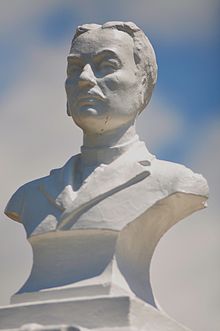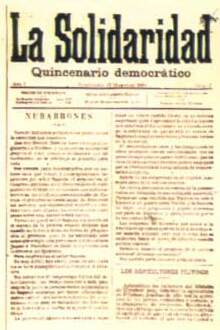| José María Panganiban | |
|---|---|
 | |
| Born | José María Panganiban y Enverga (1863-02-01)February 1, 1863 Mambulao, Camarines, Captaincy General of the Philippines, Spanish Empire |
| Died | August 19, 1890(1890-08-19) (aged 27) Barcelona, Spain |
| Monuments | Jose Panganiban, Daet, and Naga, Camarines Sur |
| Nationality | Spanish, Filipino |
| Other names | Jomapa, J.M.P. |
| Alma mater | Holy Rosary Seminary, Colegio de San Juan de Letran, University of Santo Tomas, University of Barcelona |
| Occupation(s) | Writer, journalist |
| Organization(s) | La Solidaridad, Asociacion Hispano-Filipina, Free Masonry |
| Movement | Philippine Revolution |
Jose Ma. Panganiban y Enverga (February 1, 1863 – August 19, 1890) was a Filipino propagandist, linguist, and essayist. He is one of the main writers and contributors for La Solidaridad, writing under the pen names "Jomapa" and "J.M.P."
Early life

Jose Ma. Panganiban was born on February 1, 1863, in Bangkal Phase II, Mambulao (a town which was subsequently renamed after him). He was the eldest of the three sons of Vicente Panganiban, originally from Hagonoy, Bulacan, and Juana Enverga, a native of Mauban, Quezon.
Panganiban developed his interest in reading at an early age from reading the cartilla, caton and catecismo taught by his mother. Once, his mother found him under a tree, sleeping beside a copy of Don Quixote, the book of Cervantes.
Since his mother died when he was a little boy, Panganiban grew up in the care of his father, the clerk of court in Daet, the capital town of the province. His father sent him to the Holy Rosary Seminary (El Seminario del Santissimo Rosario) of Nueva Caceres (now Naga City, Camarines Sur) and became the protégé of the seminary rector Fr. Santoja. He earned the praises of his teachers because of his aptitude to easily absorb his lessons. At 12, he mastered Latin and Spanish and at 15, the Classics and Natural Sciences.
He was good at writing and was articulate in expressing his ideas. Because of this, the Spanish Governor-General who happened to be visiting the province and heard him speak during a school program commended him. In April 1878, he wrote A Nuestro Obispo in honor of Bishop Francisco Gainza who was on a visit to Mambulao. Unknown to many of his fellow Bicolanos was Panganiban’s superior academic credentials as a student at the seminary with grades of sobresaliente (excellent) in all subjects.
Father Santoja became instrumental for Panganiban’s studies in Manila. The priest recommended him to the Colegio de San Juan de Letran where he obtained his degree of Bachelor of Arts in 1883. Wanting to become a medical practitioner, he took up medical courses at the University of Santo Tomas and at the same time taking vocational courses in agriculture at Letran so that in 1885, he received the title of Agricultural Expert. While at the University in 1887, he wrote Anatomia de Regines which was recognized as one of his brilliant literary works. His papers on general pathology, therapeutics and surgical anatomy was also awarded prizes.
An anthology of his works was gathered by Fr. Gregorio Echevarria, rector of University of Santo Tomas, and sent to be exhibited at the 1887 Exposicion General de Filipinas in Madrid.
Activities for the Propaganda Movement

In May 1888, Panganiban sailed for Spain and continued his medical studies at the University of Barcelona, Spain, where he met other Filipino propagandists agitating for reforms in the colony. He joined reformist groups such as the Asociacion Hispano-Filipina and La Solidaridad because he believed in instituting reforms in the Philippines, and used the pen names "Jomapa" and "J.M.P."
On April 25, 1889 Panganiban signed a petition addressed to the Spanish Minister of Colonies, requesting Filipino representation in the Spanish Cortes. While in Spain, he learned other languages including German, Italian, and French, adding to the Spanish and Latin that he learned during his student days in the seminary of Nueva Caceres (Naga City, Camarines Sur). He was able to translate into Spanish the book of German author Carl Julius Weber entitled: Die Religio und Die Religionen (Religion and Other Religions).
Being one of the writers of the La Solidaridad, he called the attention of the Spaniards on the freedom of the press and criticized the educational system in the Philippines. His works were recognized by Jose Rizal who even said "He was a true orator, of easy and energetic words, vigorous in concepts and of practical and transcendental ideas". Among the articles he published were "El Pensamiento", "La Universidad de Manila: Su Plan de Estudio", and "Los Nuevos Ayuntamientos de Filipinas". He continued to write poems and short stories, including "Ang Lupang Tinubuan", "Noches en Mambulao", "Sa Aking buhay", "Bahia de Mambulao", "La Mejerde Oro", "Amor mio", "Clarita Perez" and "Kandeng".
Death
Panganiban contracted tuberculosis and apologized to Rizal that he could not help further in the movement. He confided in Rizal that, "If I only have the strength I had before, I will work with you unto the bitter end". It is a measure of Panganiban’s patriotism and his dedication to the cause that despite the rigors of poverty and the ravages of tuberculosis, he persisted till the end in the struggle of reforms.
On August 19, 1890, he died in his boarding house at No. 2 Rambla de Canaletas, Barcelona. He was buried in grave No. 2043 of the Southwest Cemetery of Barcelona. His grave has the epitaph: Here lies the avenger of the honor of the Filipinos, written by Graciano Lopez Jaena."
The Filipino propagandists in Europe mourned Panganiban’s death. Jose Rizal eulogized Panganiban as an "excellent companion of labor and difficulty... endowed with uncommon talent, with privileged intelligence, and with indefatigable industry, (he) was one of the sacred, legitimate hopes of his unfortunate country.... What should be grieved at is the thought that he died without finishing the noble mission which his exceptional faculties had destined for him."
Dr. Domingo Abella, a historian, located the remains of his province mate in Spain and brought them back to the Philippines. His remains now lie inside the pedestal of the Jose Ma. Panganiban Monument, installed by the National Historical Institute at Jose Panganiban, Camarines Norte.
Legacy

- The town of Mambulao, Camarines Norte, was renamed to Jose Panganiban in honor of its native son by Act No. 4155 issued on 1 December 1934.
- Panganiban Drive (formerly Calle de Legaspi), Naga City- one of Naga City's main avenue at the very heart of the city connecting Elias Angeles Street (formerly Calle Real), and Pan Philippine Highway
- President Emilio Aguinaldo cited the country's appreciation of Panganiban's patriotic labors in his opening address at the Congress assembled at Malolos City, Bulacan on September 15, 1898, he (Pres. Aguinaldo) invoked the spirits of the departed heroes of the Fatherland, saying:
- Illustrious spirits of Rizal, Lopez Jaena, of Marcelo del Pilar! August shades of Burgos, Pelaez and PANGANIBAN! Warlike geniuses of Aguinaldo (Crispulo-O.), and Tirona, of Natividad and Evangelista! Arise a moment from your unknown graves!
Monuments
Jose Maria Panganiban monument in front of Hagonoy Central School (gabaldon) Hagonoy, Bulacan, However, it was transferred elsewhere when the said school was demolished.
- Jose Maria Panganiban Monument - at Naga Central School 1, Naga City, Camarines Sur.
- Jose Maria Panganiban Monument - a bronze statue (9 ft. tall) installed on February 1, 1985, by the National Historical Institute in his home town Jose Panganiban, Camarines Norte, which contains the remains.
- Jose Maria Panganiban Monuments - at the lobby of Provincial Capitol and at the Provincial Capitol Grounds, Daet, Camarines Norte
Notes
- "House Bill 4671" (PDF). Archived from the original (PDF) on February 26, 2021. Retrieved February 26, 2021.
- Zaide, Gregorio F. Jose Rizal: life, works and writings of a genius, writer, scientist and national hero. 2nd edition. Quezon City: All-Nations publishing Co., Inc.c2007pp177-178
- Osias, Camilo. Jose Rizal: His Life and Times.Manila: Oscol Educational Publishers, 1948.pp207
- La Solidaridad, Madrid, Spain. September 30, 1890
- Zaide, Gregorio. The Philippine Revolution.p252
References
- La Solidaridad, Madrid, Spain. September 30, 1890 Edition
- Osias, Camilo. Jose Rizal: His Life and Times. Manila: Oscol Educational Publishers, 1948
- Quirino, Carlos. Who's Who in Philippine History. Manila: Tahanan Books, 1995.
- Manuel, E. Arsenio. Dictionary of Philippine Biography Volume 1. QC. Filipinos, 1955.
- Zaide, Gregorio F. Great Filipinos in History. Manila: Verde Bookstore, 1970.
- Zaide, Gregorio F. The Philippine Revolution. Manila
- Zaide, Gregorio F. Jose Rizal: life, works and writings of a genius, writer, scientist and national hero. 2nd edition. Quezon City: All-Nations publishing Co., Inc. c2007
- Ponce, Mariano "Jose Maria Panganiban y Enverga." La Solidaridad, Sept 30 1890.
- Jose Panganiban Municipal Planning and Development Office Archives
- Jose Panganiban Municipal Annual Yearbook
As of this edit, this article uses content from "Jose Ma. Panganiban", which is licensed in a way that permits reuse under the Creative Commons Attribution-ShareAlike 3.0 Unported License, but not under the GFDL. All relevant terms must be followed.
External links
- National Historical Commission of the Philippines - Historic Preservation Division Accessed 2 December 2012
- National Historical Commission of the Philippines Archived 2012-12-21 at archive.today Accessed 1 December 2012
- National Historical Institute biography of Jose Ma. Panganiban Accessed 5 September 2009
- 1863 births
- 1890 deaths
- 19th-century essayists
- 19th-century linguists
- 19th-century Filipino writers
- 19th-century Spanish writers
- 19th-century Spanish male writers
- 19th-century deaths from tuberculosis
- Anti-Spanish sentiment
- Bicolano people
- Colegio de San Juan de Letran alumni
- Filipino emigrants to Spain
- Filipino essayists
- Filipino expatriates in Spain
- Filipino journalists
- Filipino propagandists
- Filipino writers of bilingual works
- Filipino Roman Catholics
- Linguists from the Philippines
- People from Camarines Norte
- People from the Spanish colonial Philippines
- Spanish-language writers of the Philippines
- Tagalog people
- University of Santo Tomas alumni
- Tuberculosis deaths in Spain